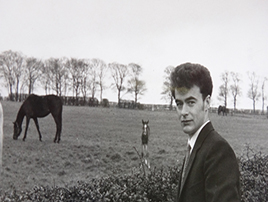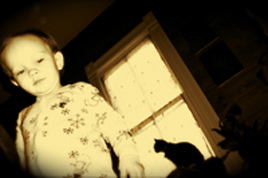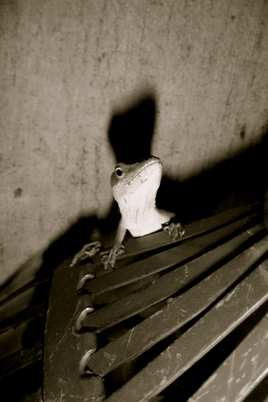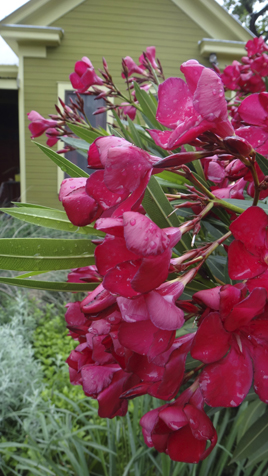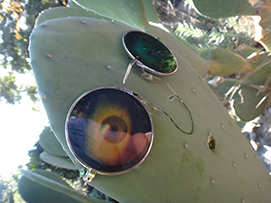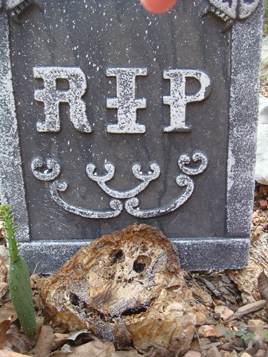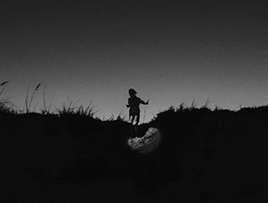My Hoja Santa getting shredded by a fierce North wind, the frost has already nipped the ends of them, giving them a really attractive new look…not. They now resemble flying banshees or soiled handkerchiefs blowing on a washing line.
“Now Dorothy, don’t you fret your pretty face about that Hoja Santa,
It will be back next year”
“I am not fretting, I was just wondering how much of it you ingested before your face turned that color?”
The North wind doth blow and we shall have snow, (not likely in Central Texas)
And what will poor robin do then, poor thing?
He’ll sit in a barn and keep himself warm
and hide his head under his wing, poor thing.
‘The North Wind doth blow’ is British in its origins and believed to have originated in the 16th century .

Here is a detail of a frost bitten Hoja Santa leaf containing detailed directions to the Aztec gold from the Black Pearl.
” I can’t believe he put the map on a Hoja Santa leaf “.
My containered papyrus grasses have also weathered the North winds of late, their heads are bowing low, their fibers surrendering to the cold and the wind and all of the other onslaughts of crazy temperatures and conditions we have been experiencing in Central Texas as of late. I am still watering all of my container plants as if it were still summer, the drought in Central Texas remains relentless.

I will chop these back to the ground pretty soon. I would highly recommend papyrus as a container plant, I am in zone 8b and this plant has been so reliable over the years. I have it planted in a “Callahans” stock tank with zero drainage…(I did not remove the plug). Give yourself ample room around it though, as it does get rather large. My tank is about 5ft diameter and 3ft deep, I give it a good soaking about once every week to ten days in the Texas summer, think the banks of the Nile where it is native. It does like it’s feet wet, but also handles a drying out period.
Here is a picture of it in it’s full summer glory this year, spreading green firework explosions out about six feet in all directions:
I still hate those home depot bricks though! I am thinking that I will remove them and plant something dark, with a low habit, around the base of the tank for contrast.This area receives mostly full sun with late afternoon shade from the post oak. Any ideas?

My Post Oak has most certainly changed over the last week or two, It has finally dropped all of its leaves conveniently in my pond. Is this year the Chinese year of the leaf? I have been knee deep in them, constantly fishing them out of my pond. A chore incidentally, that I hate.
“Aaa Ha Ha Ha, like ESP even knows what a chore is”!
Laugh all you want Walton’s, I bet you don’t have a 900 gallon fish tank positioned under a towering Post Oak?
….Oh you do?
Damn Walton’s!

Elodea may establish itself if just ‘thrown’ into a pond. It is a member of the aquarium-important frog’s-bit family Hydrocharitaceae. My fish hide under this green canopy, when the temperatures dip, I don’t see them for days.
like miniature jungle film sets, complete with Tarzan swing vines. I believe
this one is called:

Sedum reflexum!
Sedum reflexum looks like a little Blue Spruce tree. It gives a nice touch of blue/grey to any rock garden or xeriscape bed. This one is adorning it’s reddish tones of winter.

“Jane, boy, errr cheetah, get hands off Tarzan’s legs, and look at all that
sedum reflexum, makes Tarzan happy”.

Here are some more hanging vines and some spreading out in some rock cavities.
I thought I would give you this palette cleansing image of a dandellion flower before I subject you, and draw your attention to something very, very, disturbing indeed, something you may wish you have never seen, something primordial? Something that could kill you if ingested? The end of days? Ok you tell me just what is this?

There were about 10 of these rather unpleasant fellows squirming and wriggling in my rain water collection tank. I have never seen them before, they were quite large from head to end of tail, about an inch and a bit long. Is this how dragon flies begin before the nymph stage?
Are those tiny gills on the right image? uuurrgghhh!
These were the best photos I could muster, I had to sharpen up these images a lot.

“No Bones, we are dealing with a highly advanced microorganism,
perhaps even intelligent life, we should try to make contact with it, communicate with it,
find out what it wants, what it’s needs are”.
“Damn it Jim, what if it gets into the entire ships water supply, what if people start dying, what then Jim?.”
One more picture of the aliens orbiting a floating pecan nut.
Other Winter Observations:

Antenna lurking behind my still blooming bulbine (try saying that one fast),
mmm what could it be?
… Ahh yes, what else but yet another cucumber beetle.
Camo on a donkey ear
Canna lilly, trying (very slowly) to produce one final bloom.
A year-end ladybug devouring some sugary residue or aphid larvae? on my mexican lime tree, I have often wondered what is going on with this white residue. Ants love it, bugs love it, I know it cannot be a good thing. Can anyone enlighten me as to the process going on here. I have a lot of leaves (underside) that has this white fur on them. There is always something going on with citrus trees…that is what makes them an interesting landscape addition.
I will leave you all with another bad picture and another
new, unidentified anomaly attached to my mexican lime tree?

Stay Tuned For:
“Rat-Tailed, Toe-Biters”
All material © 2008 for east_side_patch. Unauthorized reproduction prohibited.







































































